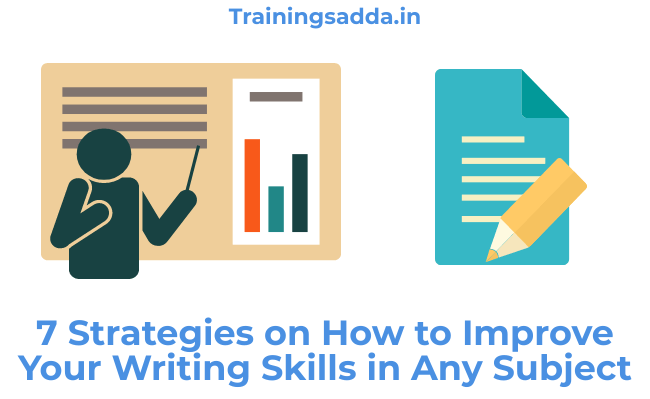7 Strategies on How to Improve Your Writing Skills in Any Subject

Last Updated on October 19, 2022 by Prabhakar A
“You can make anything by writing.”- CS Lewis
Writing is a skill everyone needs to develop in his/her personal as well as professional life. From writing essays during your school exams to creating a well-researched thesis for your Ph.D., writing is a very essential skill. And not to forget “Content is the king’ when it comes to marketing. Even when you have to impress your boss via email, formal writing skills can give you an added advantage.
Writing is everywhere, from the roadside banners you see during a long drive to the time you fall asleep while reading your favourite novel.
Read more: 7 Realistic Resolutions for Professional Writers
As though it may sound, anyone can develop writing skills. Writing is all about pouring your thoughts out into a well-structured format that others would love to read. Everyone can write, all it takes is to start.
To inspire you a little more here’s one of my favourite quotes: “If I waited for perfection, I would never write a word.”- Margaret Atwood
So, here are a few basic steps to improve your writing skills over time.
Table of Contents
Basic steps to improve your writing skills
Practice makes a man perfect:
It has been rightly said that ‘practice makes a man perfect’ and it applies here too. The first step that you need to take in order to improve your writing skills is ‘by Writing more and more.’ To write well you don’t need to be a scholar with a strong vocabulary. Writing is thinking on a paper(keyboard in today’s world) and everyone thinks. The toughest part of writing is getting started. Start with writing whatever random thought crosses your mind, start with a paragraph, but start.
As you write more and more you’ll gradually start getting better. Once you see your writing skills improving, get back to your earlier written stuff and make edits to make it better.
Also, since many students are preparing for their MBA Entrance Exams, regularly practicing writing can help them in improving their writing skills to score well in the WAT section.
Improvements can only be made to things that exist, so just start.
Know your audience:
When you are writing for yourself, you can write whatever you want to. But when you write for an audience, you gotta keep them entertained. And this is where knowing your audience is very important before you start writing for them after all ‘it’s for your audience’.
Start by asking yourself questions like:
‘What does your audience like reading?’
Not everyone loves reading everything and you should never write to impress everyone. Be loyal to your audience.
‘What problems will your writing solve for the reader?’
Apart from a great story, readers(especially on the internet) read a piece of writing only if they find it valuable that offers solutions to their problems. The better you know your audience, the better you understand their problems.
Know more: Write My Assignment So That I Will Stop Get Nervous
‘What tone does your audience love?’ What is it that keeps them continue reading? It can be anything from humour to optimism to a formal write up. The tone is very important since it conveys emotions, thereby connecting with the audience.
When you question yourself, you’ll gradually better understand your audience and see your writing improve over time.
Think before you write:
‘Writing is a great skill but thinking is a better one.’
The mind cannot always come up with ideas instantly. And even if you are writing up a well-researched piece of article, you first need to think about the structure of the article before you start writing. One thing that all writers have in common is that they think more and before they write.
Also, you don’t always have to think, just go blank and let the subconscious take over and you’ll find new and unique ideas popping up when you least expected.
Learn more: 20 Education Apps for Android and iOS
Reading helps in writing:
“Read a thousand books, and your words will flow like a river.”-Lisa See
Reading and writing are like inseparable twins. A well-read writer knows the difference between a good and a bad piece of writing. Moreover, reading introduces you to new forms of writing styles, different genres, masterpieces that can inspire you and much more. Basically, reading can put you in the shoes of your audience and make you learn how you emotionally connect to writing. Reading is a tool that every writer needs to carry along with them on their journey of writing.
You don’t need to read what you write about, instead just focus on reading as much as you can.

Brainstorming with others is a key to grow:
Every mind you have a chat with can help you improve your writing skills even if they aren’t writers. Don’t underestimate what non-professionals can contribute to your writing. Everyone has a different mindset and perceives things differently. Brainstorming with others can open gateways to new ideas that your mind may have never thought of. Such ideas don’t need to be perfect, you can always refine them according to your style but it will help in exploring new ideas.
Read more: 7 Benefits of Using Microsoft Office for Students
Include stories as examples in your write up:
Stories are a great way to keep readers engaged. Including short stories as examples in your write up are a great way to inspire readers while delivering valuable content. Readers feel more attracted to a piece of content that has characters they can feel connected to. Never miss the chance to connect with your readers via stories.
Read your writing once you are done:
Everything you write can be improved by proofreading it. There are many thoughts that your mind may come up after you have finished a piece of article. Give your mind a break before you get back to reread your writing and you’ll be surprised to see new thoughts pouring in that can significantly add more value to your content.
Summing Up:
Writing is a wanderer’s mind transformed into words. And every mind wanders. Focus, dedication, and persistence are the key to upskilling your writing.
Always remember:
“You might not write well every day but you can always edit a bad page. You can’t edit a blank page.”- Jodi Picoult
Author Bio: Rahul Dixit is an educational researcher at MBARendezous which assists students with MBA Entrance Exams. He also loves writing about different topics affecting the world like technology and the economy.
Comments
0 comments




